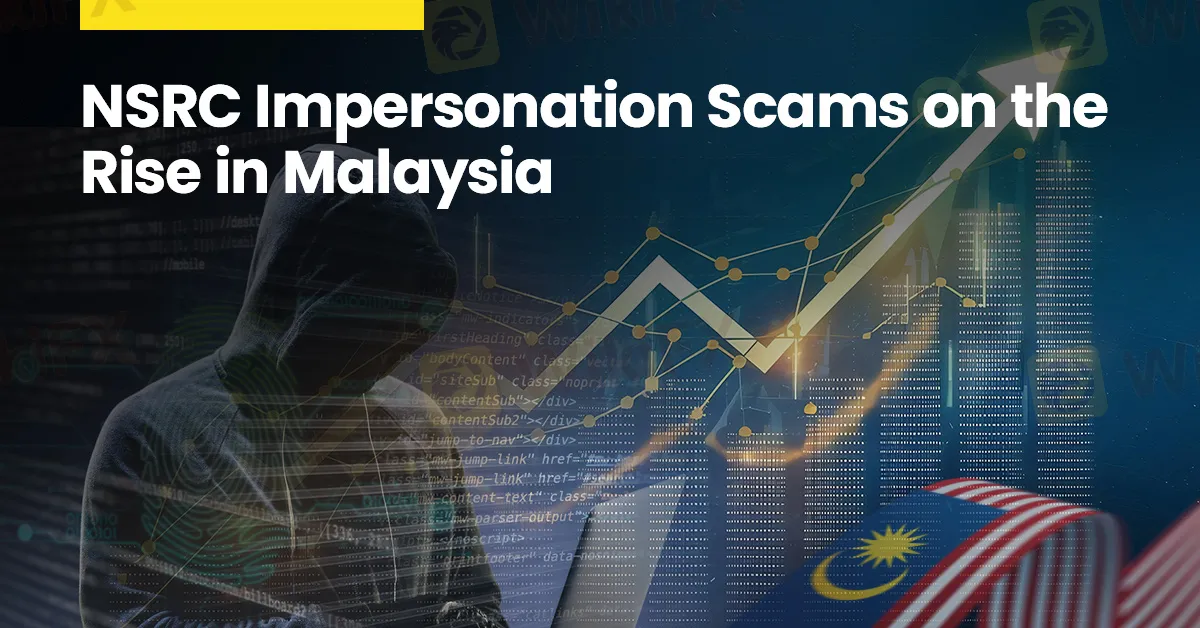简体中文
繁體中文
English
Pусский
日本語
ภาษาไทย
Tiếng Việt
Bahasa Indonesia
Español
हिन्दी
Filippiiniläinen
Français
Deutsch
Português
Türkçe
한국어
العربية
NSRC Impersonation Scams on the Rise in Malaysia
Abstract:The article underscores the imperative for public vigilance against impersonation scams targeting bank customers, emphasizing the heightened risk posed by fraudulent calls from individuals masquerading as National Scam Response Centre officers.

Amidst a surge in scams impersonating National Scam Response Centre (NSRC) officers, the public receives a stern caution from the Association of Banks in Malaysia (ABM) and the Association of Islamic Banking and Financial Institutions Malaysia (AIBIM). These scams, if successful, could lead to significant financial losses for unsuspecting victims.
Typically, the scam begins with victims receiving calls from individuals claiming to be NSRC officers. These callers allege that the victims' identities, including their National Registration Identity Card (NRIC) numbers or mobile numbers, are linked to illegal activities such as money laundering and transactions involving mule accounts.
The fraudulent tactics deployed by these impostors are sophisticated, involving prolonged interrogation techniques that mimic authentic investigations. Through persistent and repeated phone calls, they gain the victims' trust and persuade them to leave their debit/ATM cards at specified locations.

This manoeuvre grants the fraudsters access to victims' online banking accounts, enabling them to execute unauthorized transfers, initiate bill payments, register for online banking services, and even withdraw cash using the victims' cards.
The NSRC operational procedures are clarified in the statement, emphasizing that the centre only receives calls from the public and does not engage in outbound calls to individuals. It advises immediate disconnection if individuals receive calls from alleged NSRC officers.
Furthermore, the public is cautioned to exercise vigilance against fraudsters impersonating representatives from enforcement agencies and regulatory bodies such as Bank Negara Malaysia and the Royal Malaysian Police. These impostors often resort to intimidation and coercion over the phone to extract sensitive information or persuade victims to transfer money.
The statement reiterates that banks will never request sensitive information such as credit/debit card numbers, CVV numbers, online banking credentials, or SMS OTP/TAC numbers from customers.
In a bid to enhance security measures, banks have implemented various initiatives since July 2023. These include substituting SMS OTP with more secure authentication methods, enhancing fraud detection mechanisms, introducing a cooling-off period for new online banking registrations, restricting secure device registrations to one per customer, and establishing a 24/7 complaint channel.
In addition to these measures, the public is advised to adopt good cyber hygiene practices, such as refraining from clicking on links from unfamiliar sources, downloading applications exclusively from official app stores, and abstaining from sharing banking details or engaging with unknown calls or messages. These precautions are essential to safeguard against financial scams and ensure the security of personal information in today's digital landscape.

Disclaimer:
The views in this article only represent the author's personal views, and do not constitute investment advice on this platform. This platform does not guarantee the accuracy, completeness and timeliness of the information in the article, and will not be liable for any loss caused by the use of or reliance on the information in the article.
Read more

Top 10 Trading Indicators Every Forex Trader Should Know
Master the top 10 Forex trading indicators to analyze real-time Forex quotes, trends, and market signals. Learn strategies to boost accuracy and avoid mistakes.

Malaysian Influencer Detained in Taiwan Over Alleged Role in Fraud Scheme
Malaysian influencer Hu Chang Mun, widely known as Ady Hu, has been detained in Taiwan for his alleged involvement in a fraudulent operation. The 31-year-old, who was reported missing earlier in December, was located by Taiwanese authorities after suspicions arose regarding his activities.

WikiEXPO Global Expert Interview: Simone Martin—— Exploring Financial Regulation Change
In the midst of financial innovation and regulation, WikiGlobal, the organizer of WikiEXPO, stays abreast of industry trends and conducts a series of insightful and distinctive interviews on pivotal topics. We are delighted to have the privilege of inviting Simone Martin for an in-depth conversation this time.

MultiBank Group Wins Big at Traders Fair Hong Kong 2024
Discover how MultiBank Group, a global leader in financial derivatives, secured three prestigious awards at Traders Fair Hong Kong 2024, highlighting its innovative trading solutions and industry excellence.
WikiFX Broker
Latest News
Geopolitical Events: What They Are & Their Impact?
Volkswagen agrees deal to avoid Germany plant closures
Top 10 Trading Indicators Every Forex Trader Should Know
WikiEXPO Global Expert Interview: Simone Martin—— Exploring Financial Regulation Change
TradingView Launches Liquidity Analysis Tool DEX Screener
MultiBank Group Wins Big at Traders Fair Hong Kong 2024
'Young investors make investment decisions impulsively to keep up with current trends' FCA Reveals
Why Do You Feel Scared During Trade Execution?
CySEC Settles Compliance Case with Fxview Operator Charlgate Ltd
Scope Markets Review: Trustworthy or Risky?
Currency Calculator


